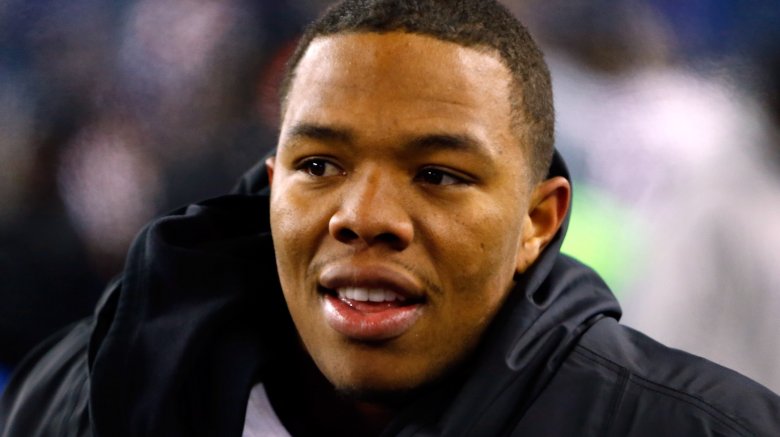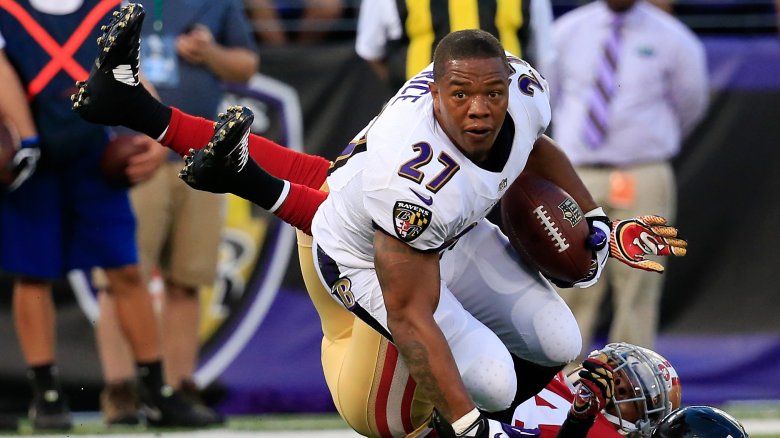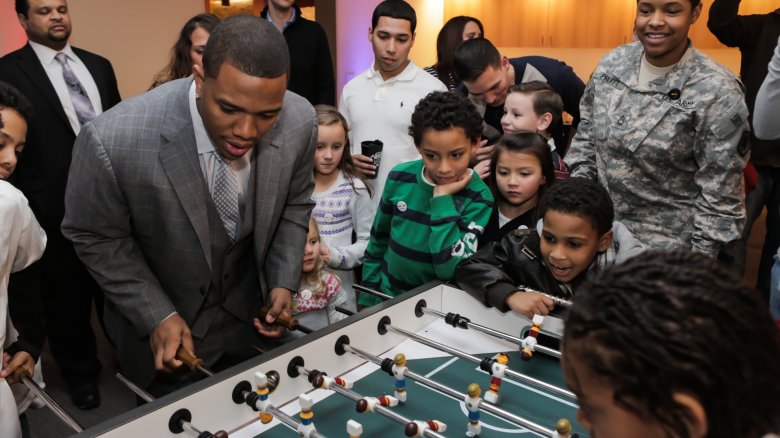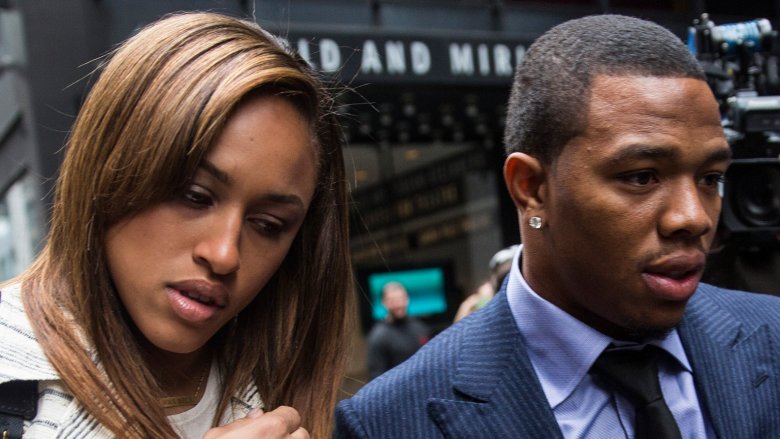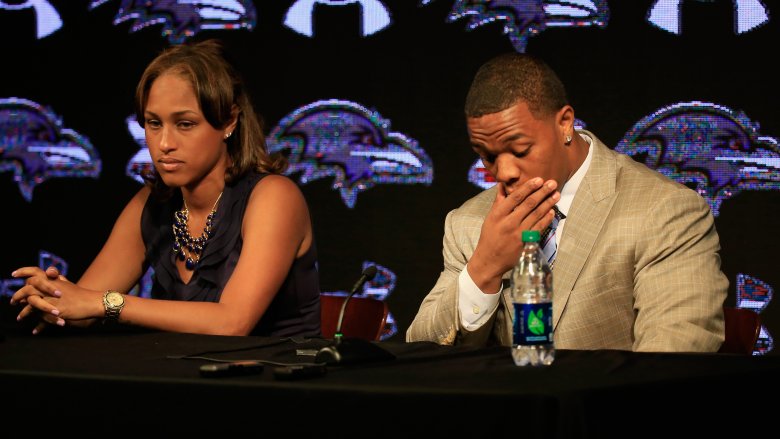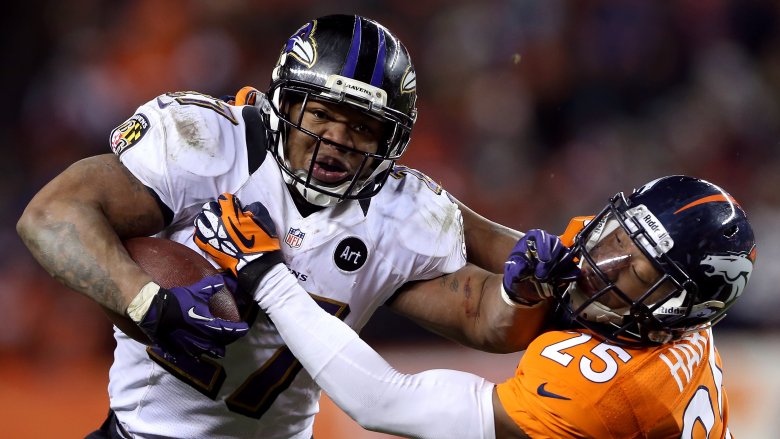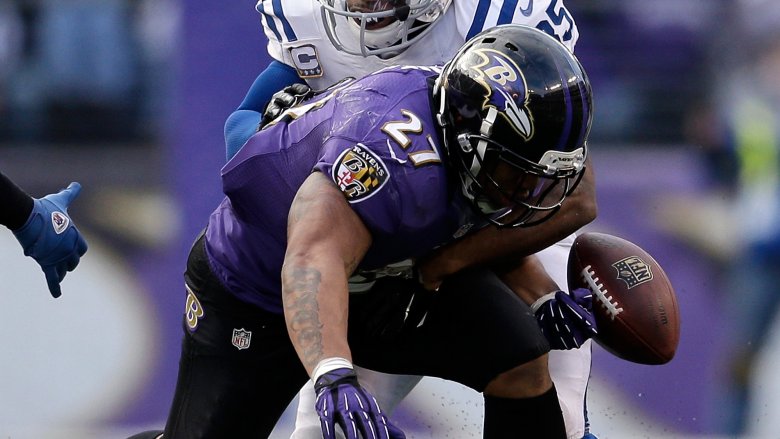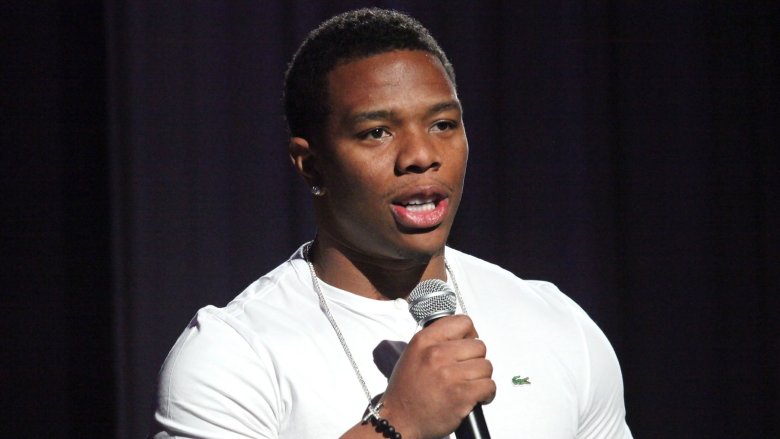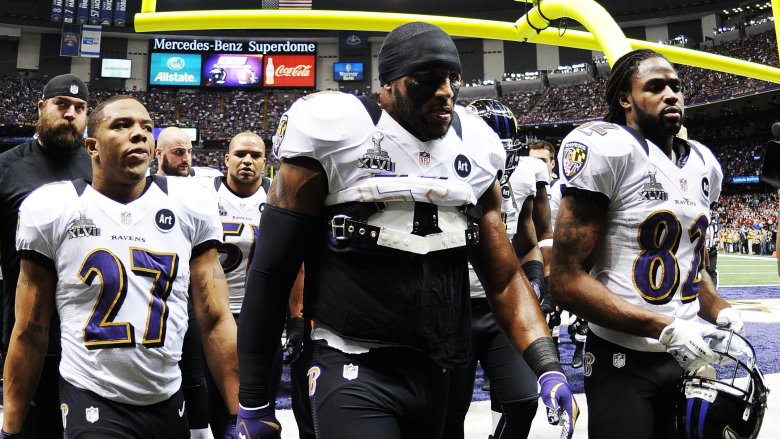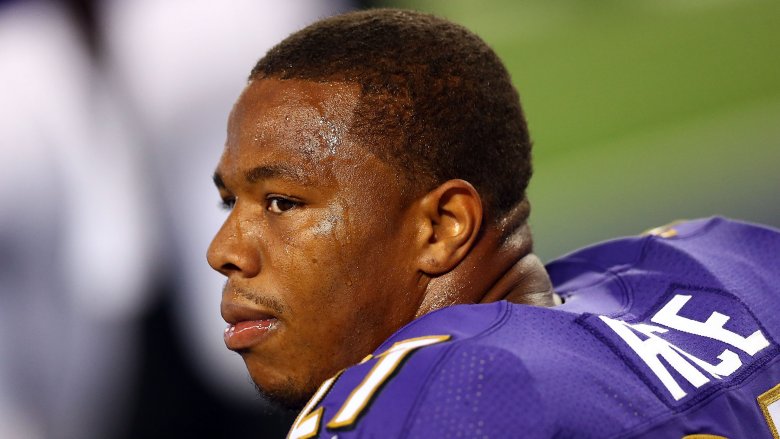Ray Rice's Disturbing Real-Life Story
Every person has two faces: the one they want you to see and the one you actually see. Former Baltimore Ravens running back Ray Rice wanted to be seen as "one of the greatest." And for most of his time in the NFL he put his best face forward. Standing at just 5-foot-8, he was an undersized overachiever who appeared in three Pro Bowls and helped the Ravens score an emotional Super Bowl victory in 2013. "It was common to say that, pound for pound, he was the best," according to NY Magazine.
Also concerned about his reputation off the field, Rice became a champion of children, a perfect fit for his persona, considering that he overcame childhood adversity. However, in 2014 the world saw another side of Rice. A pair of videos leaked to the public seven months apart showed him not as an inspirational underdog who made kids smile, but as a brutal abuser who ferociously assaulted his fiancée. As the scandal unfolded we learned deeply troubling things about Ray Rice, the Baltimore Ravens, and the NFL and noticed an ugly pattern in how people respond to domestic violence. Here's the disturbing story of Ray Rice.
The start of a broken fairytale
Speaking with ESPN, Ray Rice's mother, Janet, referred to him as "a blizzard baby." He was born six weeks early during a furious snowstorm in 1987. Janet considered it one of the many "pranks" her son would pull on her throughout the years. But seen another way, Rice's entry into the world was a metaphor for a childhood that was often cold and bitter.
When Rice was 1 year old, his father, Calvin Reed, was accidentally gunned down in a drive-by shooting. His cousin Myshaun Rice-Nichols attempted to fill the paternal void but died in a car accident when Rice was 11. Worsening an already tough situation, Rice's mother worked several jobs for lousy pay, so he swept floors at a barbershop to chip in. Per NY Magazine, at age 15 Rice met 14-year-old Janay Palmer, his future wife. She didn't live in Rice's hometown of New Rochelle, New York, but in Mount Vernon, where his dad was killed. The teens grew close, and Rice became attached to Palmer's parents, even calling her father "Dad."
In college Rice would make the previously abysmal Rutgers football team relevant, helping them win their first bowl game while he broke records. When he got drafted by the Baltimore Ravens, the ever loyal Janay Palmer moved to Maryland because he asked her to. In a fairytale this would have been the start of happily ever after. But Rice became the villain of his own story.
A Ray of Hope-ocrisy
Ray Rice cared deeply about how people perceived him. In 2010 he said, "One thing I know about life is that you build an image for yourself." Rice portrayed himself as a gentle-hearted hero who loved kids. He purchased pricy video games for children and visited sick youngsters in the hospital. As if trying to put the milk in "milquetoast," he posed with Baltimore's mayor while wearing a milk mustache. The bread-and-butter of his wholesome image was his anti-bullying campaign.
In public appearances and social media posts Rice made it abundantly clear that he didn't condone picking on people and claimed he couldn't comprehend why anyone does it. At a 2013 event called "A Ray of Hope" he declared, "I truly feel like it's a crime if you back somebody into a corner and they feel defenseless." Rice also reached out to the families of children who lost their lives to bullying.
His message resonated with children. Rice told CBS he received "thousands of emails from kids who have been bullied." His message to them: "It's okay to be who they are." We can't say for sure whether this version of Rice was sincere or a con artist. But the year after he made his highly publicized anti-bullying remarks, his carefully crafted good guy persona imploded.
Ray's darkness comes to light
In 2012 Ray Rice unwittingly predicted his own future: "I've seen some guys with the same dream as me, wanting to make it in the NFL, but they made one or two bad decisions in their life and that dream became a total nightmare." In 2014 Rice became a nightmare for the woman he had known since she was 14 years old.
It was the horrific culmination of an unhealthy situation. As NY Magazine detailed, after Rice's fiancée Janay (above) joined him in Baltimore the couple rarely spoke, which was how Rice wanted it. In 2012 she bore their daughter Rayven but didn't get much help with parenting. In fact, when she asked Rice to be more involved, he "overbooked charity events — often three back-to-back on his one day off each week" to avoid home. And when Janay expressed displeasure about his celebrity lifestyle, he nicknamed her "Dreamkiller."
For Valentine's Day 2014 they went to Atlantic City. The pair argued at their hotel and entered an elevator where Rice viciously punched Janay in the face, causing her skull to slam against the hand railing. Within days TMZ published security camera footage of Rice dragging her unconscious body from the elevator and placing her face-down on the floor. The NFL suspended him for two games. But when TMZ released video of the actual assault in September 2014, Rice's NFL career effectively ended.
Rice hits the PR panic button
In the immediate aftermath of the Atlantic City assault Ray Rice tried to salvage his image. Rather than owning up to what he did, he denied guilt in court, quickly married Janay, and tried to assure the press that he was "a happy father and happy husband." Presumably, it was also a "happy" coincidence that once Rice married his fiancée it was unlikely that she'd be required to testify against him in court.
The Baltimore Ravens "aided" Rice in his quest to downplay his punching out Janay and pulling her body along the floor like luggage. During a May 2014 press conference — which NY Magazine called "a disaster" — Rice publicly "apologized to the NFL and to his fans," but left out his wife, who was sitting right beside him. To further distance himself from his actions, he didn't describe the incident as domestic violence but as "the situation my wife and I were in."
In an effort to exonerate her husband in the court of public opinion Janay apologized during the press conference for her "role" in the assault. Months later she claimed that Rice felt "terrified" after knocking her out. As usual her wellbeing took a backseat to her husband's.
Quoth the Ravens
For the first seven months of the scandal the Baltimore Ravens were Ray Rice's personal cheerleaders. The team didn't just hold a press conference wherein Janay Rice apologized for getting brutally knocked out by a professional football player. No, they also showcased her apology on Twitter: "Janay Rice says she deeply regrets the role that she played on the night of the incident." The Ravens deleted that repugnant tweet three months later, according to Deadspin.
What made the tweet especially odious was that the Ravens didn't simply echo Janay's words in some morally tone-deaf attempt to protect their player. As Sports Illustrated explained, Janay said the team specifically asked her to apologize publicly and even gave her "a general script" to follow during the press conference. This was victim-blaming at its most insidious.
The Ravens weren't alone in judging Janay. CNN commentator Ana Navarro criticized her decision to marry Rice, tweeting that "as women, we need to love & respect ourselves 1st." Fox and Friends host Brian Kilmeade said the marriage sent "a terrible message" and callously joked, "The message is, take the stairs." As USA Today contributor Amanda Marcotte pointed out, such comments needlessly shame victims of domestic abuse, who already struggle with self-doubt and low self-esteem. Regardless of intent, that's arguably "just doing the abuser's work for him."
Rice gets slapped on the wrist
Justice might be blind, but fame often carries enough weight to tip the scales. Advocates for domestic violence victims have argued Ray Rice got a slap on the wrist because of his celebrity. After pleading not guilty to a crime he obviously committed, he gained entry into a pretrial intervention program that allowed him to have his assault charges dismissed. That's exceedingly rare in instances of domestic violence. The Associated Press determined that from 2010 to 2013 just 70 out of 15,000-plus domestic assault cases brought before the New Jersey Superior Court were accepted into the pretrial program.
Instead of paying for his crime Rice paid $125 in fines and underwent anger management counseling, which amounts to a "get out of jail mostly free" card. In a cruel twist, the woman he brutalized had to help him evade negative repercussions for his actions. As part of the agreement Janay attended counseling with her husband.
Not everyone thought Rice got off easy. One law professor argued that he received unusually harsh treatment because county prosecutors opted to handle his case rather than leaving it to a municipal court, which likely would have dismissed the charges without any stipulations unless Janay pursued the case. Instead Rice was slightly inconvenienced before being let off the hook. It's hard to find something that sounds harsh about either of those scenarios, even if you aren't a lawyer.
The NFL drops the ball
Throughout the Ray Rice scandal the NFL did its darnedest to come out smelling like a rose but ended up reeking of B.S. According to ESPN, the Baltimore Ravens wanted officials to go easy on their star running back, and Commissioner Roger Goodell obliged. In July 2014 Rice received a two-game suspension, which Ravens head coach John Harbaugh described as "not a big deal." The league attempted to deflect criticism for the light punishment by blaming Janay Rice. A representative claimed she "made a moving and apparently convincing case" that the NFL shouldn't "ruin" her husband's "image and career with sanctions." Janay later disputed this account.
When the NFL placed Rice on that exceedingly brief timeout, the public had only seen footage of the crime's grotesque aftermath, Rice dragging Janay across the floor. However, the Ravens knew for months that footage of the actual assault existed and was "f*cking horrible," according to a lawyer who watched it. When TMZ revealed that hideousness, the Ravens canned Rice and the NFL banned him, claiming he misled officials about the incident. Ray Rice decried the ban and an arbitrator overturned it.
Amid concerns that the NFL perpetrated a cover-up, the NFL asked former FBI director Robert Mueller to investigate. Mueller concluded that league officials didn't actively conceal Rice's behavior, but they also barely tried to uncover the truth.
Rice tries to outrun his shadow
A celebrity's misdeeds loom largest under a darkening spotlight. Once Ray Rice's crime surfaced, his once-glittering football career faded to black. Unwilling to accept that outcome, he insisted on trying to piece his shattered halo back together. Dead-set on returning to the NFL, Rice hired crisis-PR specialist Matthew Hiltzik, who had previously leant his expertise to Justin Bieber and Hillary Clinton. Hiltzik set up multiple interviews aimed at painting Rice as a good guy who made a bad mistake and got unfairly vilified for it. He also appealed his NFL suspension and was reinstated a few months after the Ravens cut him — if a team calls, he can start playing any day now.
Predictably, Rice's bid to reform his image included community outreach and charity work. CBS Sports reported that he bought Christmas presents for at-risk youths and gave talks at colleges and conferences. Meanwhile, he stayed in peak physical condition, evidently hoping that good deeds would make his stigma disappear and convince a football team to hire him. He didn't get hired, but the NFL enlisted him to educate players about social responsibility.
Above all, Rice has said that he's contrite. He told NBC that punching his fiancée was "the worst decision" he ever made, adding, "I'm going to pay that consequence for the rest of my life." However, that statement rings hollow when you consider that Rice dodged criminal prosecution and remained popular among Baltimore residents.
The paradox of forgiveness
No one is entitled to forgiveness, regardless of how much they apologize. However, Gary Myers of the New York Daily News raised the interesting question of why the NFL didn't want to give Rice a second chance yet teams have happily signed an accused rapist and multiple players who committed domestic violence, including one who broke four bones in his girlfriend's face on camera. He argued that "Rice became the face of domestic violence in the NFL," which made teams unwilling to forgive him.
Meyers' assessment makes sense. As ESPN noted, the NFL's lax response to Rice's crime drew enormous criticism, prompting the league to update its policies on domestic abuse. Bringing him back into the fold could easily send the wrong message. And as Myers pointed out, being tough on Rice has ironically allowed the league to go easy on less prominent abusers without hurting its bottom line.
Underlying the league's apparent double-standard is the fundamental question of whether forgiving a criminal means condoning their crime. For those who say that it does, Ray Rice can never be forgiven. But according to criminology professor Shadd Maruna, treating criminals as irredeemable makes them more likely to reoffend. In fact, offenders who construct positive redemption narratives about themselves and receive opportunities to reintegrate into society appear more likely to go straight. In that sense, the question of forgiving Rice isn't just about optics, but rehabilitation.
Seeing versus believing
The Ray Rice story provided a depressing illustration of the saying "seeing is believing." Among other things, it demonstrated that when people don't want to believe something, they simply refuse to see it. That certainly seemed true of the Baltimore Ravens, who declined to watch the footage of Rice viciously hitting his longtime partner and even partially defended his behavior until that nauseating scene became viewable to the public. NFL Commissioner Roger Goodell was complicit in that odious defense until he literally saw how awful the crime was.
One could argue that the league's abhorrent handling of the situation had nothing to do with belief, but rather a cynical desire to establish plausible deniability — that by being willfully blind to what Rice did, officials could insulate themselves from criticism for not responding more harshly. But even that interpretation relies on the distressing assumption that as long as people didn't physically see the assault take place, they could somehow justify underreacting to it.
Perception also played a crucial role in the victim-blaming that occurred. As Psychology Today explained, humans like to see the world as fair. Accordingly, people tend to assume that victims of crimes like rape or domestic violence somehow "asked for it." That's utter nonsense, but admitting it makes the world look unpredictably ugly. Ray Rice forced people to see that ugliness in graphic detail, an unforgivable sin in an image-driven existence.
